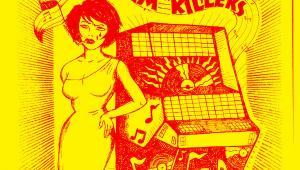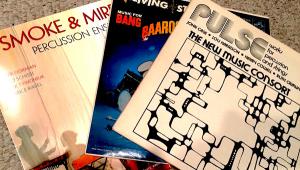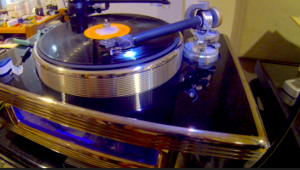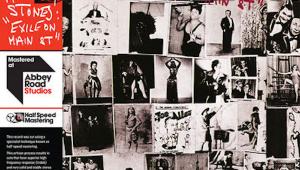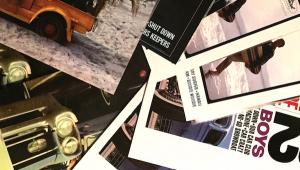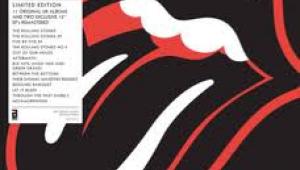Which Beethoven?
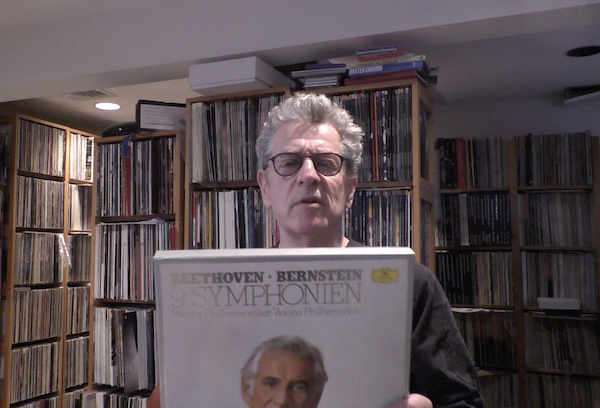
That said, the video is still filled with interesting and insightful information about choosing a Beethoven set either new or in the used bins as well as a strong advocacy for your doing so even if you don't like classical music.
Also: some laughs and surprises.
- Log in or register to post comments


Excellent review, Mikey. Readers Digest, Bernstein and Karajan are now on my bucket list. Could we have more? The Repress reviews are good, but I'd like to hear more about the used records in your collection (jazz, rock, pop) and why you chose them. For example, which is better: Miles Davis mono Columbia or stereo)?

Speaking of RCA - my favorite is the superlative version of the Second Hungarian Rhapsody by the Sour Kraut Band, recorded in San Francisco as pictured on the Album cover:
https://www.youtube.com/watch?v=mdEYnKEcMLs&list=PLF59261116965E7CA

I have always been partial to the performances on Bernstein's cycle of Beethoven Symphonies on Deutsche Grammophon recorded live with the Vienna Philharmonic in the late seventies and early eighties.

Thanks so much, Michael, for posting this. You may not be an "expert" in classical music, but there were plenty of interesting insights here. I have been collecting classical records since I was 10 (in 1970), and for my actual 10th birthday I was given the Karajan set. Somewhere along the road I lost it, but some years ago I picked up an early "Large Tulip" pressing and it remains my benchmark, go-to recording. (Incidentally, DG records in general do not have an audiophile reputation, but early "large tulip" pressings sound terrific -- and with later pressings there are still some great-sounding records, you just have to go hunting and expect some trial-and-error). I was wondering what your opinion is on the sound of the Bernstein reissue; I have those original LPs and they are fine but not great, but this new set has been touted as a major improvement. RE: the Rattle set, I have been really tempted, but the price is steep -- however it looks like your rave review has swayed me. I have the Leibovitz set in a beautiful reissue from some years back -- an excellent choice too. I recently acquired the Classic Records reissue of the complete Josef Krips set on Everest, which had had a less than great history in both LP and CD formats. The Classic reissue is stellar, revealing the superb recording, and I happen to like the somewhat more low-key performances; alas there is some speed instability which I guess Classic could not eradicate. Now, that Bruno Walter set intrigues: I have never seen that box anywhere, but how are the pressings -- Columbia records are notoriously unreliable. I would love to own this.
You are quite correct about how well-mastered records from digital can sound superior. I recently got the complete Mahler symphonies by Bernstein (his early Columbia cycle) reissued from digital onto vinyl. Absolutely fantastic (and if you don't have this set you should seriously consider).
Incidentally I have picked up many Reader's Digest sets (of mainly non-classical fare) and they are often great sounding. Thanks for bringing peoples' attention to them.
Please do more classical soon!!!!!

I don't recommend the Readers Digest version as it is only seven records. As a result, some compression was used. Most of these sets are eight records. As a result, most of them squeeze the third on one disc and the 9th on three sides. When you consider sound and performance my personal favorite is the Solti 1975 box on London/Decca. The performances range from good to near the best. The 9th is spread to four sides and is electric. The third is spread to a third side with no mid movement break. Not every one is top shelf, Solti's #6 isn't close to Walter's, but as a set it is very competitive on performance. As for sound it, like the Readers Digest, was recorded by Wilke. Some multi mikeing to be sure, but not nearly as bad as post 1965 DGG.
Regarding Bruno Walters set, all indications I've read over the years indicate his CA recording were made in the American Legion Hall in So Cal. To many of his performances are duds, in my opinion, to recommend the entire set. But his Sixth remains my all time favorite classical record. I truly love his Brahms and Mozart.

I’ll 2nd that ! Bruno Walters Brahms recordings are to be cherished !

Hey- that was great. You should do more like this one, perhaps exploring the different classical labels like RCA Living Stereo, Mercury Living Presence, Decca and London, DG, Philips, Everest, etc. Fascinating histories with all of these labels. You could do a whole series. Or how about film composers like Bernard Herrmann? You could spend a whole hour showing the great recordings available on LP. Or the countless other great film composers. Just think of this as a nice reprieve from your hectic travel schedule. Who needs Munich anyway?

I saw what RinziRadio had to say about this one. It is one of my favorites as well. While I have a very early original pressing I still found it to suffer from DGG compression. DGG early, large scale stereo pressings usually suffer from this. Perhaps they did it to make their pressing easy to track. Look at the way DGG cut this set compared to Solti's on London/Decca.
But there is a silver lining for the 1962 Karajan set. The DGG SACD's of these symphonies are a real ear opener.

The Rafael Kubelik on DGG, each symphony with a different orchestra, is also worth checking out. Hard to find on LP (I have a Japanese pressing), but available on CD if you look hard enough. Yes, the early Solti cycle on Decca sounds terrific, though his 60s recordings of 3,5,7 are fantastic (and fetch equally fantastic prices). I know Speaker's Corner did a reissue of the Karajan cycle, though I cannot speak to the sound quality of that. Anyone hear able to offer an opinion?
Another surprisingly good cycle is that of Ernest Ansermet: the Ace of Diamonds budget reissues cost a fraction of the original Deccas and sound just as good (Ansermet's Brahms cycle is also a lesser-known dark horse in excellent sound). I also like the Schmidt-Isserstedt cycle on Decca -- old-school, thoroughly idiomatic again with that gorgeous Decca sound.
Frankly, one can never get enough Beethoven.......

I picked up a Hoagy Carmichael RD box set in mono at Half Priced Books for $4.
It was in excellent condition. It's wonderful.

Fantastic Michael!
So informative and so much fun. My 2 cents - don't overlook the Karl Boehm edition on DG. (My current favorite) But try to get the edition that isn't made for changers with the symphonies split across discs —
you'll be glad you did.

Is it based upon the conductor, the orchestra, the vocal soloists in the 9th, the recording venue or the sound quality?
Suppose a particular set is not available on LP - for example the 2011 cycle by Riccardo Chailly and the Leipzig Gewandhausorchester on Decca?
Does that disqualify it from consideration?

A devil's advocate and second-guesser? A professional contrarian? Can't you just enjoy MF's observations without commenting on whether they are backed up by double-blind testing, etc? They are just opinions and should be taken as such. He wasn't writing a definitive study of the recorded versions of Beethoven's symphonies! By the way, some of the new Chailly CD's are incredible Beethoven recordings and interpretations, so I give you that. Relax! Enjoy the music!

... more important than others.
Some music enthusiasts will tolerate a relatively poor sounding recording of a favorite artist while some audiophiles might place greater emphasis on a recording's sound quality over the artist's performance.

As long as it's listener, I'll take an inspiring performance over sound quality. Those early RCA Toscaninis (also known for his ice cream - a Cambridge joke) and Furtwanglers are worth hearing.

So my two cents as I have numerous collections; the Bohm is very good, solid and beautiful as only Bohm could do it. The von Karajan box set from 1962 is one of the best, no, it is not perfect - he does seem to falter a little with the six but the rest of the symphonies are very good especially the fourth, which he rightfully takes fast the way it is supposed to be played. Always interesting to hear other performers take it too slow which kills it. I also like his 1977 recordings, more weight and less fresh than the 60's, but still quite good. If you can find I also recommend the von Karajan Beethoven series he recorded with EMI in the early 50's. Yes, it is in mono but it is quite good as well. I know some here have mentioned Furtwangler, but that box set from the 50's is just not up to his reputation. I think that Furtwangler live was always a better bet, especially his recordings during and before WWII, there is this electricism about all his performances, and his approach will sometimes surprise. I believe the same thing about Bruno Walter, after he left Vienna and came to North America most of his recordings did not have that intensity and drive he was known for in Europe. The Mackerras is also good as is the Klemperer, not perfect but enjoyable. Have been tempted by the Rattle, but his performances are to me at least, never memorable. If you are looking for the best box set of the new millenia then look no further than Abbado's last attempt at Beethoven with the Berliners. Here you have a fresh almost Italianate approach that is absolutely mind blowing. His third and ninth are absolutely perfect, fact there is nothing to find wrong about the other symphonies. If you have not heard then I suggest you do, that ninth is absolutely perfect.

During the late 40‘s and 50‘s Furtwaengler lost it. Orchestra members and conductor lost their unity of pre-war and war times. There are hundreds of vinyl recordings from small labels to find. Quality varies wildly. Especially his war times recordings are difficult to hunt down in good audio quality. And yes, you have to deal with his behavior with the Nazi-regime somehow. The best Beethoven was recorded in the deepest war years. You can say, it was a far cry for humanity, but you can also argue he was simple megalomaniac.

There were some great recordings after 1947, in particular those with the Lausanne Orchestra, some nice recordings came from that partnership. But if you want Furtwangler in all his glory go back previous to 1947 for great recordings. His Bruckner 8th and 9th done with the VPO & BPO in 1944 is one of the greatest recordings ever made. On one Brucker 5th from the 40's ou can hear bombs exploding in the background. Neat!

Actually, the wartime Furtwangler recordings with the Berlin Philharmonic have just been issued on the BPO's label in, for the first time, transfers from the original master tapes which were taken back to Russia at the end of the war. Here is the link:
https://www.berliner-philharmoniker-recordings.com/radio-recordings.html
You can find some interesting discussion of these on a number of forums, including this one where I have put in my 2 cents worth.
https://www.talkclassical.com/58135-furtw-ngler-22-disc.html?highlight=F...
The audio quality of this new box is extraordinary, and the accompanying documentation is fascinating. It's not cheap, but worth every penny. Anyone remotely interested in the history of recorded classical music and recording technology should investigate this. Clearly the Germans were way ahead in recording technology. Furtwangler's performances really stand in a class of their own, and I am referring to his "live" recordings primarily. He did not take naturally to studio conditions (although his Tristan und Isolde for EMI and his Schumann 4th for DG are exceptions). Between this new set and the box that came out a few years ago from Audite of his post-War recordings for RIAS one is able to hear exactly what makes him so unique in more than acceptable sound. The sense of music being conjured into existence on-the-spot is uncanny, and there are times when the intensity is overwhelming. Furtwangler's performances truly are creative acts in their own right. On the new Berlin PO set one of the highlights is the final movement of Brahms 1st Symphony, performed with the allied forces practically at the gates, and the electricity going off. The music oozes brimstone and doom; it was the last concert Furtwangler gave before fleeing to Switzerland.

And for anyone interested there is going to be a review and discussion of this new Furtwangler BPO set this Saturday, March 16th, on BBC Radio 3's Record Review. Program begins at 9am London time, but you will also be able to stream for the next 4 weeks.

It was an eye opener when I heard them in the early 90's but the sound wasn't that great. I have been tempted by this new box set and will probably pull the trigger but oh the cost. Still it is a better deal than some of the Esoteric SACD's I buy.

Thanks for mentioning the mono Karajan cycle for EMI. His Pastoral in that set is excellent. I actually liked the Rattle VPO set a few years ago, despite the weirdness of hearing the VPO strings adopt a HIP approach with minimal vibrato. Around that time I heard Rattle conduct the 9th with the BPO at the Proms in London and it blew the roof off the Royal Albert Hall. Stunning, and one of the greatest evenings of music in my lifetime. I love Abbado too, and it's interesting to check out some of his earlier recordings for Decca and DG against his last cycle. I am also a big fan of Colin Davis's cycle with the Dresden Staatskapelle. Wonderful dark, burnished sound and fine readings in the grander classical manner.

Nice of you to comment here with us. I am relatively new to the Karajan EMI mono having found his complete recordings box set on special only recently, so only going through it now but yes, I believe that Beethoven set especially the 6th, as you mention, is well worth seeking out. I do not own the Davis box set but wouldn't doubt his capabilities, he was something special and from that generation of conductors very missed. As for Abbado, I found his Beethoven cycle from the late 80's to be very inconsistent, I am so glad he revisited it in 1999/2000 as I think it is very special and one of my faves.

Abbado is pretty special in much of what he did. His final cycle with the BPO is terrific, although I am also fond of the earlier one which is often dismissed. I have not heard the 80s cycle you mention, which was with the Vienna Philharmonic. I was lucky enough to go to many of Colin Davis's opera performances when he was music director at the Royal Opera House, Covent Garden (I was a teenager at the time). Wagner's complete Ring, Berg's Lulu, Weber's Der Freischutz are amongst many that were thrillingly conducted. A much under-appreciated conductor.

We had a Thorens TD-145. I seam to remember in the manual the antiskate having a setting for wet plyback and dry playback. Ringing any bells for anyone?

... made for wet playback of analog discs. It resembled a tonearm, with a brush where the cartridge would otherwise be located and a fluid reservoir in place of the counterweight. An interconnecting tube fed the fluid to the brush, which would ride on the disc and moisten the grooves ahead of the stylus.
An identical (or extremely similar) product is available from Analogis: http://www.analogis.eu/6101_en.html

It is hard to beat the Berlin Philharmonic with Maestro Karajan, however, the multi-channel (MCH) recording set released on Blu-Ray by the Berlin Philharmonic under Sir Simon Rattle is also very good, and the recording quality is impossible to beat - 5.1 at 96Khz / 24 bit.
IMHO, classical symphonic music is much too BIG for just 2 channels - the only way to experience what you hear in a good hall is 5.1 MCH.

Nice walk through Mikey. I learned from junk shop purchases just how great some of the RCA samplers from back in the day were, some of them even had the shaded dog label. But as far as recommendations for Beethoven go, I've found a reference in Otto Klemperer for the symphonies and Wilhelm Kempff for the piano works. Iona Brown's Argo recording of the Violin concerto is also well worth seeking out.

Fun post, Michael!
The 1958-59 Bruno Walter/Columbia Symphony cycle was recorded at American Legion Post #43 in Hollywood. The Post has a Facebook page that gives the history:
https://www.facebook.com/hollywoodpost43/posts/post-43-auditorium-histor...
POST 43 AUDITORIUM HISTORY: 1958 and 1959 were busy years for the Columbia Symphony Orchestra and for Bruno Walter, who utilized the wonderful acoustics of the Hollywood Legion Post 43 Auditorium to perform "Ludwig van Beethoven – The Complete Symphonies."
There is a fascinating clip of Walter rehearsing the 4th Symphony at the Hall here:
https://archive.org/details/BrunoWalterRehearsesTheAdagioOfTheBeethoven4...

This was a fun video Mr. F. Thanks.
Of course, there is no "One Set" to get, but your point, that it's good to start somewhere, is well taken. Ultimately, if you grow to like these symphonies, I think you will want to hear different versions of them. I have three or four "sets", but prefer to pick and choose conductor/ orchestra and symphony from individual albums. Your point is "sets", and it is interesting to hear a unified approach, but I think it's always best to listen to recorded music from a variety of perspectives—it's too easy to fall into "the one true way" dogma. Listen to lots of versions and different musical ideas will be revealed. All the easier in this case as you can't swing a dead cat without hitting any number of interesting, inexpensive Beethoven symphony recordings.
Lovely to have this recording of Walter rehearsing, gjetson. Thank you for that! I have a small collection of recordings of conductors either rehearsing or "in conversation". (I guess that outs me as a true classical geek.) It's a relief to hear that Walter uses Pah-pum or da-dum rather than toy-toy!

Really enjoyed the last two videos in this format. Thanks Michael!

Michael - judging from the enthusiastic response to this video I hope you are encouraged to do more videos on you’re favourite classical music on vinyl.

I believe the Electric Recording Company is working on a new box set. You will need deep pockets to purchase the set.

Recently I purchased and am now enjoying Blue Note’s Spirit & Time. Not an inexpensive purchase and now I just ordered this Beethoven set from Berlin Phil. Another expensive vinyl purchase! Hope it sounds as good as you advertised. My reference is DG’s Karajan performance by the same orchestra.

Michael sure has an expensive taste!
If one were sure that these new boxes will never again be re-issued, they might be a clever investment.
I'm a bit skepticle about the Simon Rattle box. Specialised reviewers of classical music are only moderately satisfied with Rattle's recordings of Beethoven. For instance, in the Guardian, they say: "technically immaculate but curiously incoherent" and give 3/5. But then again, here: http://www.musicweb-international.com/classrev/2016/May/Beethoven_sys_BP... , the reviewer is extremely positive: "This Beethoven cycle represents a formidable achievement. It’s both memorable and distinguished."
But at €299 (+postage), this is 'capital investment'...
I'm hesitant to ask, Michael, but did you buy the Rattle box or was it sent to you?

Thanks for a most enjoyable video! I heartily second your recommendation of the Leibowitz cycle. While some may quibble about individual symphonies, I've found this cycle to be excellent performance-wise and sonics-wise. I have two sets of theses discs, one pressed in the US and one pressed in the UK. The UK set has a slight edge, but not nearly as great as the variation between say, UK versus US pressed Londons.
I have several other Beethoven sets, including the fabric-covered Bruno Walter set, which is quite enjoyable. Your readers also might look for the Schmidt-Isserstedt/Vienna Philharmonic series on Decca/London. As you might expect, the sound is top-drawer and I've always enjoyed the performances. Another very good Beethoven cycle with reasonable sound was recorded by Franz Konwitschny with the Gewandhaus Orchestra on Eterna. And here's a Beethoven cycle that won't set you back a bundle: the great Paul Kletzki conducting the Prague Philharmonic on Supraphon. Finally, I agree with the reader who mentioned Solti's cycle with the Chicago Symphony Orchestra as something to look for.
One thing's certain: you can never have enough of Beethoven's symphonies!

Well, you inspire us, Mikey!!
I was wondering if you could offer any thoughts on the sound quality of the new Bernstein cycle remaster compared to the old LPs (which I have).
I will also repeat my plug for the recent vinyl reissue of Bernstein's earlier complete Mahler cycle on CBS. Cut from remastered digital, but the sound is terrific and a vast improvement on original release records. Highly recommended.
Been looking for the Jarvi set everywhere -- not one to be seen, alas....

Once again, a side note remark you made about one point microphone recordings, was an eye opener for me... A quick search (on Qobuz.com) brought me to Beethoven's Symphonies n°5 directed by Carlos Kleibner, and an amazing recording of Mahler's 1st symphony directed by Eliahu Inbal.
What a joy to listen to - even if it is digital.
Thank you, M!

Thanks for the video. The four commonly available boxes you displayed are all great versions. I have obsessively collected Beethoven on LP from age 15 up until about a year ago when I gave up the vinyl habit. I've joined the Borg Audio collective. That said, so much of my music listening through those four decades been to those records you displayed. I have bought and re-bought and compared various versions of Beethoven Symphonies for decades, thought I give a few recollections.
The first Beethoven Symphony LP I recall was my mother's copy of the Pastorale, something I must have heard around 1965-66. An italian orchestra on a budget label, bought at the supermarket. A few years later I got truly and finally sucked into the LP habit via Berlioz Symphonie Fantastique [and it would be Fantastique if that — STEREO SPECTACULAR ! ! ! — SEX & DRUGS & CLASSICAL MUSIC ! ! ! — were your next cart dig through the classical bins]. A year later—The Beethoven Bicentennial Year—Beethoven was to me what the Beatles were to me a year ago, the most progressive sounding music I heard up to that point, Revolution #9 excepted. I altered my hairstyle accordingly.
I repeatedly checked out Bruno Walter's mono recording of the "Chorale" symphony from the library. That spot where I use to read "High Fidelity" and "Stereo Review" while listening to the records on their sturdy turntables has been replaced by a shop for cheap furniture [fortunatly, there's a bigger, better and newer library around the corner]. The mono sound of Bruno Walter's first Beethoven cycle is nowhere as good as on the stereo remakes, but the adagio of this 9th is a marvel. The Columbia Symphony Orchestra "Pastorale" is one of the all time greats, vivid recording and energized playing, fast-ish but not too and "rustic" as all get out, with a lot more rhythmic energy from Walter than usual. A keeper in multiple formats, early 6-eye stereo the best I've heard. All the digital copies I heard have all been altered in their own ways but I haven't anything more recent than the single layer SACD. The rip of the early CD I'm listening to now sounds decent enough, though there's more particulate matter in the hiss than there ought to be.
That Karajan set brings to mind Ron Pendorf, the owner and operator of "Recollections" in Berkeley, who passed away recently. I visited his shop frequently in the late 80's, early 1990s. He had international auctions on LP collectables, like the "Shaded Dog" Living Stereo RCA Victor classical LPs that HP was drooling over. Pendorf got something like $300 a pop at the time [often from Japan], his LPs carefully graded and auditioned on good gear. I remembered Ron telling me that the LP set that should have been collectable was that early pressing of the Karajan/BPO DGG Beethoven Symphony cycle. A super-clean copy for $40 was about right at the time. This factoid is worth noting on account of so many of the pressings out there being bad enough to dodge. That US-Pressed, Mail-Order Club "Beethoven Bicentennial Edition" that Time-Life offered? Dodge. The non-"tulip" repressings, solid-yellow labled discs that followed were sterilized with a solid-state cutting chain that warped the eq. Decent enough, but nowhere as good as the originals. Haven't heard the Hi-Rez reissues of this glorious set, the first reissues to digital are not all that good, know there's a Blu-Ray offering. Tempting. All I need is another Blu-Ray player.
Always liked Bernstein's Beethoven, haven't stopped listening to his second [1964] NYPO recording of the 7th Symphony, recorded for what was at the time Columbia Records. Vivid sound, vivid playing, one of Bernstein's best. The record came out a little after the "Summer of Love" The original cover was colorized al-la Richard Avedon. Must have been something in the air
Got the Leibowitz set a few years back for $1. Well played, well recorded. My copy was a $1 copy of the set with matching condition of the package. Records were in decent but not spectacular shape. Tempos run in the general direction of Historically Informed Performance Practice [HIPP].
Which brings us to those two sets I haven't heard yet. I bought the SACD of Paavo Jarvi's "Chorale", started playing it, started digging it, left the disc in a Blu-Ray that was carted off to Washington by my stepson. But I know I'll get to it someday. Rattle doubtless is permanently out of reach. Rattle never has been a "selling point" for me anyway.
Two essential sets, not to my knowledge on LP but worth it anyway. David Zinman and the Tonhalle Orchestra Zurich made a cycle for the ultra-cheapie Arte Nova. It made a big stir from the get-go. A lot of people can't stand it. Zinmann takes Beethoven's metronome markings seriously, along with a whole lot of other HIPPsterisms, including an extemporaneous ornament or two. Everything is fast and light, which works just about perfectly for the 7th. There's a touch of Mendelssohn in his Eroica. Sound is purdy dern good, all things considered, ensemble is top-notch. For what it's worth, this combo's recording of Schumann's Symphony #2 is out of this world.
John Eliot Gardiner and his Orchestre Révolutionnaire et Romantique for Archiv is the ultimate HIPPster edition—original instruments, original bowings, valveless brass, tympani played with hard sticks. What this group's got that Norrington and Hogwood and Bruggen and about a half dozen other Baroque specialists who decided to expand their repertory into the 19th century didn't is that Gardnier's Orchestra can play like von Karajan's. Revelatory. As far as I can tell, the recording quality is better than Zinman's.

Thanks for this! I like Sir Simon's recent set more than I thought I would. I prefer slightly brisker tempi than some present, as it's probably more historically accurate. My exception to this is the slow movement of the 7th. I just like it slow, like Bernstein. By the way that was the 3rd you sang, not the 7th. Thanks again!

Thanks for pointing me to a new source for music!
I’m getting back into vinyl. I graduated in the early 80’s so my music library moved from 6-7 records to hundreds of CDs over time.
I stared looking on the for readers digest collection on the Big E and found the Bruno collection you showed that you said was the only one you had seen in that cover
Well the links below and the want 2K!!! For anyone with some spare cash.
Beethoven: The Nine Symphonies
Bruno Walter, The Columbia Symphony Orchestra
https://rover.ebay.com/rover/0/0/0?mpre=https%3A%2F%2Fwww.ebay.com%2Fulk...

"Which Beethoven?" is your question?
My pick would be Ludwig. The greatest, in my opinion!
There is also a dog, but he was far less consequential.

Excellent piece but a couple points - Jarvi is pronounced Yarvi and Walter is pronounce Valter.
With regards to the Karajan set - I cannot abide his performances. Take the first movement of the 7th. It's in 6/8 and it's supposed to dance. He has the Berlin playing as if it were in 4/4 which gives it a militaristic march feel. Most of his Beethoven is like that.
What's wonderful about the Leibowitz is his observances of, or approaching that, of Beethoven's metronome markings. BTW, that set can be found on the German label "Analogue Audio Association" in excellent pressings. OOP, unfortunately.
HP used to have some of the Walter's on Japanese Sony pressings, which are quite good, but the Classic Records pressings are also good.
Thanks for the recommendation of the Rattle.

Another potential thrift store find to keep an eye out for: a very fine set by James Loughran and the Hallé Orchestra from the late 1970s that to my knowledge has never been issued in any digital medium. It got around the problem of long side lengths in the 3rd symphony by putting the last movement on side 1, track 1.

I am also very fond of the 1972 Karl Böhm set the the Vienna Philharmonic on DG. The booklet says it was in tribute to the 150th anniversary of Beethoven's death. A bit morbid, but they are great performances.
I also greatly love Carlos Kleiber's Fifth (and Seventh) and only wish that he at least recorded the Ninth if not the whole cycle.
I finally broke down and bought the Rattle set on Michael's recommendation.
My main love is the Ninth, so I have many versions of that and while I'm not totally in love with Norrington's "period correct" version, it is at least an interesting listen. Funny that it has the fastest first, third, and fourth movements of my recordings - but also the longest second!
I will have the look about the Krips reissues. I have the Everest LP and breaking the third movement across the two sides is horrible.
Thanks for the video Michael!
Matt

Like others have noted, Bruno Walter's cycle was recorded at the American Legion Hall in Hollywood. I possess the Odyssey 7-LP budget reissue set of this cycle as well as a mid-80s Columbia Special Products CD reissue. The Odyssey LPs sound pretty good (remastered using newer cutting heads) but the earlier Six-Eyes issues benefit from tube mastering and cutting. The CSP CD reissue is surprisingly full-sounding for what it is.
Other sets I possess on LP which are seriously worth hearing, and which are fairly commonplace and very low-cost on the second-hand market:
Toscanini/NBC Symphony, RCA Victor, monaural recordings from 1949 through 1952. Although originally issued in 1954 as a super-lavish leather-embossed box (I've seen pictures but not the actual set in my hand), the 1957 7-LP issue (LM-6901) is very common. For several years, the RCA Victor Record Club and other clubs issued this set as a "new customer" promo at a cheap teaser price if you bought a few more LPs at full price. Vigorous, intense performances. These recordings reflect early magnetic tape technology but were recorded - mostly in Carnegie Hall but a couple in Rockefeller Center's Studio 8H - using a single RCA microphone. The sound quality is good for that day and age, although without the huge dynamic range of contemporary Mercury Living Presence LPs. Well worth hearing. Toscanini made an earlier Beethoven symphony cycle in 1939 and many of us consider those performances even better but that's another story. The 7-LP box has a very, very stern portrait of Maestro Toscanini on the cover. The program notes were issued just after Toscanini's passing in January 1957. I recently acquired a NM copy for 99 cents at a used-record store, it's a common title.
George Szell/The Cleveland Orchestra, Epic or Columbia 7-LP box set, recorded 1959 to 1964. If you want my opinion on the performances, see my review of the cheap Sony Masters CD set on Amazon. Although the CD set is good, and on less-than-optimal turntables those Epic or Columbia LPs sound compressed and so-so, on the right gear that Szell set recorded at Severance Hall sounds surprisingly live. From an interpretive and orchestral perspective, this is similar to Toscanini/NBC but IMHO more enjoyable. I prefer listening to this Szell cycle than the Karajan/Berlin set from 1962, although I do like the Karajan/Berlin set issued in 1977 and recorded in the Philharmonie rather than in the very reverberant Jesus-Christus-Kirche Dahlem location where the '62 set was taped.
Two last honorable mentions:
Joseph Krips/London Symphony cycle recorded by Everest using 35-mm magnetic film and superb minimalist miking in Walthamstow Town Hall. This album presents a rather distant perspective and the orchestral sections blend together much as they do from many middle-of-the-hall audience seats. My early heavy Everest pressings exhibit a wonderful bloom to the sound. Unfortunately, many Everest pressings were made after the company was acquired in 1965 and pressed on horrible vinyl. Five years ago, Classic Records made a painstakingly-careful vinyl reissue of this set. The performances are enjoyable but a blend of "middle of the road" style for Beethoven. Also issued on a very cheap and surprisingly good CD reissue, "Beethoven in a Tin Can", by Madacy which astonishingly reissued directly from the original 35mm tapes. Not as good as the LPs but very listenable and dirt-cheap on the used market.
Last of all, I join others in recommending the first Bernstein cycle with the New York Philharmonic, recorded 1961 to 1964. The original 8-LP box set had a beautiful gold-embossed head of Beethoven set against a striking black background. The program notes were very good accompanied by many great photos of Bernstein the orchestra. Wonderful performances, though the sound of the LPs is a bit bright and compressed at times (I no longer have this set, but was listening to the pretty-good CD reissue in the "Bernstein Symphony Edition" box set).
Three cheers for Ludwig!

You have to hear Beethoven's Symphony #9; conducted by Bernard Haitink; Concertgebouw Orchestra Amersterdam; Chorus of the Concertbouw Orchestra. Recorded in 1980. I have the Phillips CD and LP. The 4th movement is an incredible moving experience. Cheers! -Robert

I have a recording (unfortunately packed away until I get my room built) of Beethoven’s 9th played on two pianos, eight hands. Supposedly, the arrangement was done so people who did not have access to an orchestra could still hear the symphony, because it would almost always be possible to find two pianos and four competent pianists, even in rural areas. Of course, the choral parts aren’t sung, but it’s still a pleasant experience, and well worth the time.

@space waves, But the part where he recommends people to listen to classical music, even if they don't like it, is quite convincing. It's true that sometimes you have to try new things to know if you like them or not.

